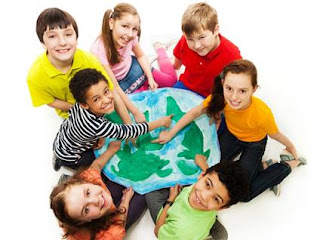In this second part of the blog “A Guide for Parents and Teachers to Develop Social Skills inPreschool Kids”, we are going to highlight some more tips for the development of social skills in kids.
Display Warm and Positive Emotions At
Home
Setbacks and
troubles are bound to happen. Therefore, parents cannot always remain in the
state of cheer. A trouble can be an opportunity for kids as they can learn to
deal with disappointment. However, your attitude should be positive. Do not
show signs of despair or anger. It has been shown in researches and it is natural
also, when parents, mothers in particular, suffer, kids are also likely to
suffer. When kids are experiencing positive emotions at home, they are likely
to develop more preschool social skills.
Talk About Your Kid’s Social World
Talk with them
about their classmates and teachers. Be a good conversationalist and discuss
everyday events. In this way, you can know what is going on in the life of the
kid. This shows that you are interested and really care about the social life
of your child. Kids who talk a lot about their peers also show an ability to
develop better social skills.
Encourage Problem Solving Attitude
Kids can have
social problems with their peers. You should encourage a constructive and
positive attitude in them. You should tell your kids that rebuffs and rejection
is a part of life. Kids having strong social skills see rebuffs as temporary
setbacks that can be easily improved. Also encourage them to see things from
other’s perspectives. This will help them in understanding what other kids
feel. Kids having the understanding of other’s perspective have strong social
skills. This makes them more responsive and they learn how to mesh their
behavior with their playmates’ behaviors.
Be Supportive and Stay Calm When Your Kid Is
Upset
Respond in a
soothing way when your kids are upset. When parents are supportive to kids,
kids are likely to be supportive to their playmates. They learn how to act and deal
with someone who is in distress. They respond appropriately and positively
according to the emotional needs of others. Such kids are socially competent.
Don’t Dismiss Negative Emotions of Kids
 When a kid is
crying, do not simply tell him to quiet. Take some time and talk about what he
feels. By doing this you can make him more socially competent, self-controlled
and reflective. This is the age when they need emotional coaching. Therefore,
do not dismiss their feelings.
When a kid is
crying, do not simply tell him to quiet. Take some time and talk about what he
feels. By doing this you can make him more socially competent, self-controlled
and reflective. This is the age when they need emotional coaching. Therefore,
do not dismiss their feelings.
 When a kid is
crying, do not simply tell him to quiet. Take some time and talk about what he
feels. By doing this you can make him more socially competent, self-controlled
and reflective. This is the age when they need emotional coaching. Therefore,
do not dismiss their feelings.
When a kid is
crying, do not simply tell him to quiet. Take some time and talk about what he
feels. By doing this you can make him more socially competent, self-controlled
and reflective. This is the age when they need emotional coaching. Therefore,
do not dismiss their feelings.
No comments:
Post a Comment